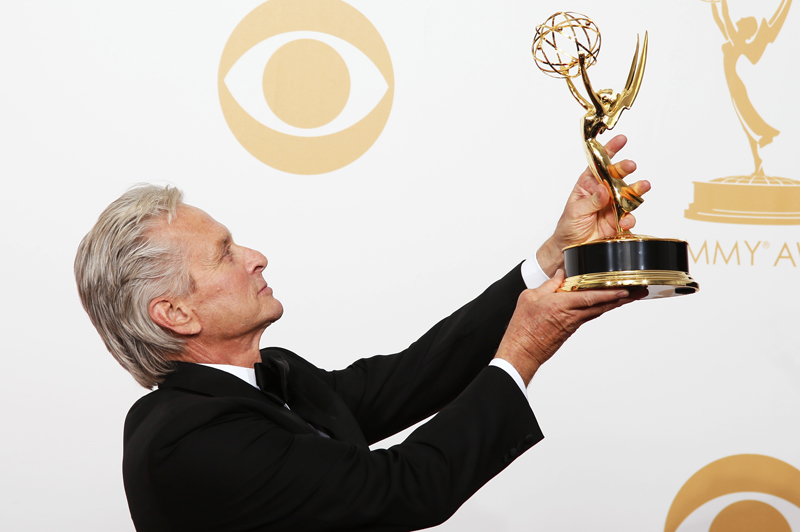
Actor Michael Douglas from HBO’s movie “Behind the Candelabra” poses backstage with his award for Outstanding Lead Actor In A Miniseries Or A Movie at the 65th Primetime Emmy Awards in Los Angeles on September 22, 2013. Photo courtesy of REUTERS/Lucy Nicholson
*Editors: This photo may only be republished with RNS-SALKIN-COLUMN, originally transmitted on March 18, 2015.
(RNS) “And the award for ‘Best public statement on the Jewish condition by a Jew in the entertainment business’”?
“The envelope, please…”
Michael Douglas.
Yes, that Michael Douglas — as in Gordon Gekko in “Wall Street,” Liberace in “Behind the Candelabra.”
In a recent essay in the Los Angeles Times, Douglas recounts how his family was on vacation in southern Europe, and his son Dylan was subjected to anti-Semitic verbal abuse at the hotel pool. Dylan was wearing a Star of David necklace.
This incident prompted Douglas to talk to his son about the pervasive presence of anti-Semitism in the world. In the essay, Douglas analyzes the reasons for the uptick in anti-Semitism. He reminds us that it is everyone’s duty to stand up to the forces of hatred and bigotry that are all too present in the world.
Douglas and his wife, actress Catherine Zeta-Jones, had taken Dylan to Israel for his bar mitzvah ceremony last summer. Then, in January, Douglas received the 2015 Genesis Prize, which honors “exceptional people whose values and achievements will inspire the next generation of Jews.”
There is a shortage of “Jewish Jews” in the entertainment business. While we can all name our own favorite exceptions to the rule, the fact is, when it comes to Judaism and Jewish connections, much of the entertainment industry is a Judaism-free zone. When we scan the list of famous Jewish actors and actresses, we find very few who seem to do anything Jewish with their lives.
Let’s go back to the very origins of the motion picture industry. The entertainment industry was the invention of Jews who were all too eager to shed their Jewishness. And then, there was the Hollywood blacklist of the late 1940s and early 1950s, which targeted alleged Communists in the entertainment industry, many of whom were Jewish.
Hollywood was how Jews could become “real” white-bread Americans. Joseph Levitch became Jerry Lewis. Allan Stewart Konigsberg became Woody Allen. Lawrence Harvey Zeigler became Larry King. And Issur Danielovitch became Kirk Douglas. But, that’s already old news.
We need more Jews in Hollywood to stand up for Judaism and Jewish causes. Here’s my fantasy: Hollywood’s most “visible” Jewish stars, taking out a full page ad in The New York Times, decrying international anti-Semitism — and then urging their gentile counterparts to join them.
We need your voices: Jason Alexander, Ed Asner, Zach Braff, the Coen brothers, Sacha Baron Cohen, Larry David, Lena Dunham, Jesse Eisenberg, Jake Gyllenhaal, Jonah Hill, Scarlett Johansson, Natalie Portman, Seth Rogen, Jerry Seinfeld and Adam Sandler (no, the cute Hanukkah song wasn’t enough), to name a few.
One last thing about Michael Douglas and his “shofar blast” on anti-Semitism: It is a modern-day Jewish miracle.
For many traditional Jews, Douglas’ Jewish identity is problematic. His father is Jewish; his mother, Diana, is not.
According to Reform Judaism, the child of a Jewish father and a non-Jewish mother is Jewish, if he or she is raised as a Jew and received a Jewish education. But Douglas, by his own admission, was raised as “nothing.”
The same thing could have been true about Douglas’ son Dylan; his mother is also not Jewish. But Dylan chose to learn about Judaism and to celebrate by becoming a bar mitzvah.
And this, in turn, inspired Douglas to reconnect with the faith of his father.
This is a sweet story — on many levels.
In many ways, Jewish history is a story of Jews reconnecting with their faith and their people.
Consider Moses — born of Israelite parents, raised as an Egyptian, who discovers his people and his destiny.
Consider Theodor Herzl — an assimilated Jew who encountered the rabid anti-Semitism in the streets of Paris during the Dreyfus trial, which inspired him to create the movement known as political Zionism.
Douglas walks in their paths. As a rabbi, I can affirm the fact that many Jews “come back” to Judaism through their children’s involvements.
Douglas’ story reminds us that many Jews create their Jewish identity in “informal” ways and through informal definitions.
Douglas obviously knows the traditional definition of Jewish identity; it was simply irrelevant to him. He became what he wanted to become (or what he already was, at least in potential). The same is true of his son Dylan. His friends “reminded” him that he was, at least in potential, Jewish.
The descendants of Kirk Douglas could have easily just melted into the American mainstream and continued to be “nothing.” Dos pintele Yid (the hidden spark of Judaism) is much more resilient than we had ever thought.
The prophet Isaiah named his son Shear-yashuv — “a remnant will return.” Michael Douglas and his son Dylan are that remnant.
(Rabbi Jeffrey K. Salkin is the spiritual leader of Temple Beth Am of Bayonne, N.J., and the author of numerous books on Jewish spirituality and ethics, published by Jewish Lights Publishing and Jewish Publication Society.)
YS/MG END SALKIN




